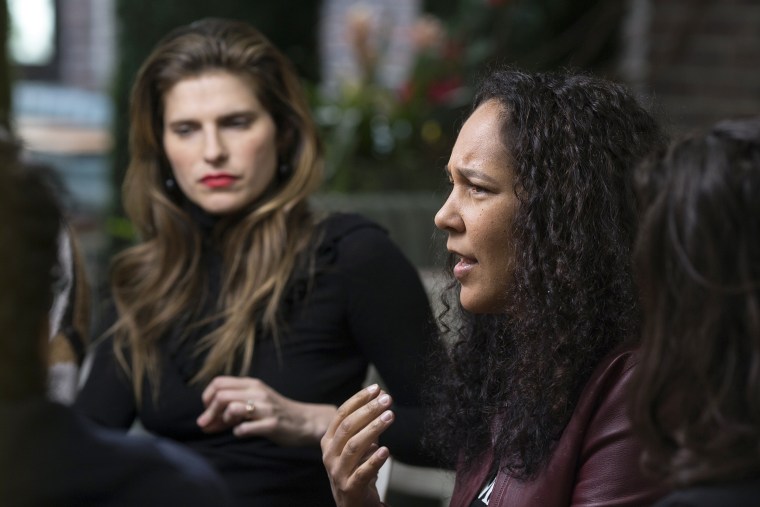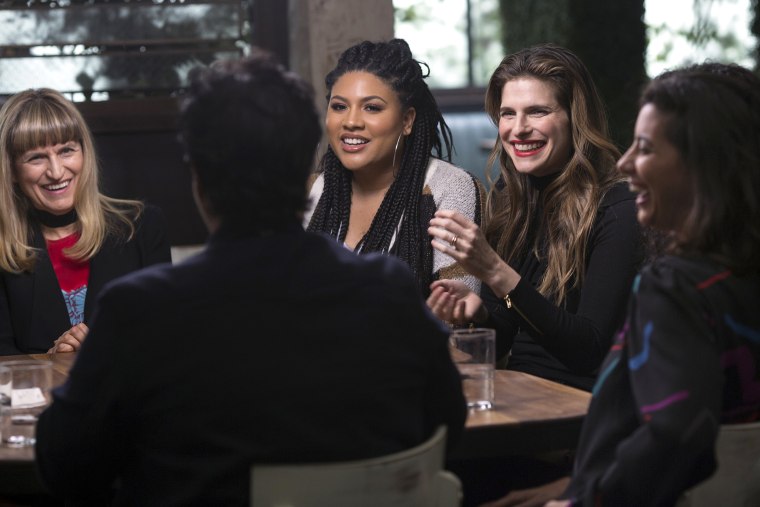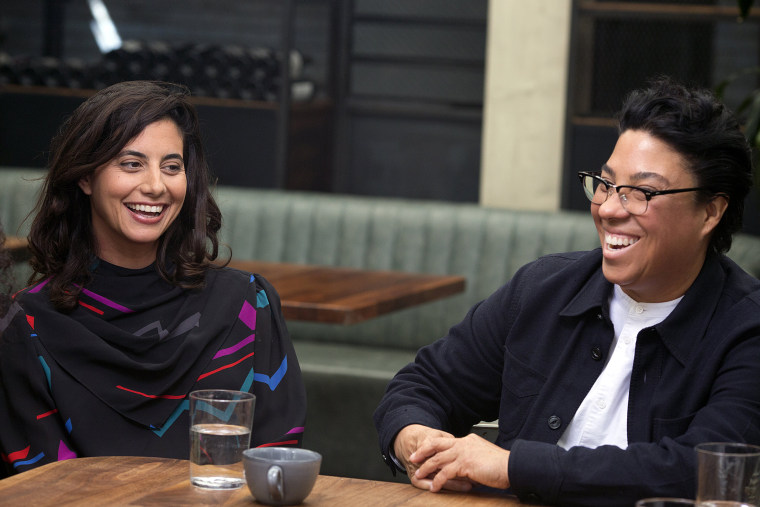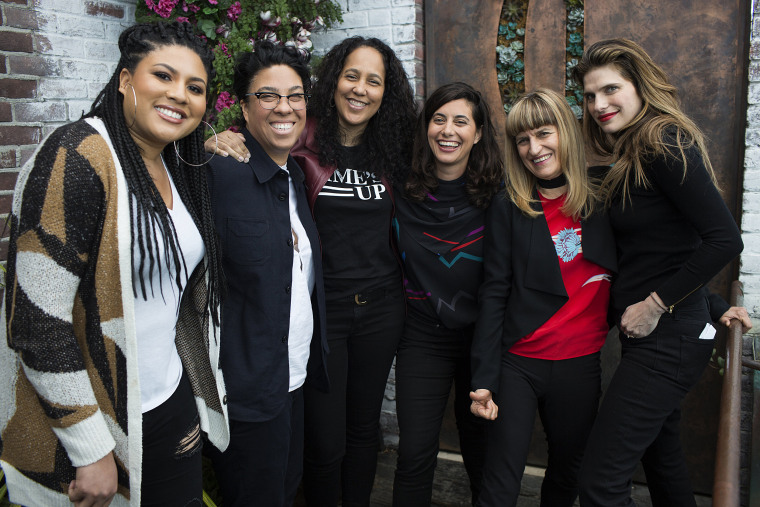It’s been nearly six months since the #MeToo movement gained new prominence in response to the revelations that numerous powerful men in the entertainment industry, among others, had systematically harassed and assaulted women.
To talk about the movement — and whether it has spurred any real change in Hollywood — NBC News sat down with six female writers, actors and directors in the entertainment industry.
Their responses, portions of which can be found below with light editing, revealed a mix of optimism for the future, but continued frustrations with the realities that women continue to face inside and outside the entertainment industry.
The participants:
- Angela Robinson, writer, director of "Professor Marston and the Wonder Woman"
- Catherine Hardwicke, director of "Thirteen," "Twilight" and "Lords of Dogtown"
- Gina Prince-Bythewood, writer and director of "Love & Basketball"
- Jessie Kahnweiler, writer, director, star of "The Skinny"
- Lake Bell, writer, actress and director of "In a World"
- Tracy Oliver, writer of "Girls Trip"
Question: Six months ago, some of the most powerful women in Hollywood stepped forward and accused Harvey Weinstein of sexual harassment. Weinstein denied the accusations, but that's since spawned the Time's Up movement and the #MeToo movement. And I wanted to gather you all here today at Catch L.A. to talk about what's really changed in the past six months for women in Hollywood. Angela, could we start with you?
Angela Robinson: Sure. What has changed so much? I'd say, with a question mark. Because it feels seismic. I kind of relate it to a natural disaster or something like a wave hit or a brushfire.
Q: Is it a civil rights movement, even? Or is that too strong of a word?
Angela Robinson: I feel like it's a continuation of many civil rights movements. I feel like a lot has changed, and there's definitely a new climate, and I'm starting to see tangible things, like I went out for a movie, which is a big studio thing, and they were only meeting women, which was surprising.
Q: The Annenberg Inclusion Initiative came up with a study that said that of 1,000, 1,100 movies in the past decade, 4 percent were directed by women. Why? Like, what is the barrier? What is stopping women from making movies?
Catherine Hardwicke: Because this is what we're fighting every day. We've all been fighting this every day. There is unconscious gender bias that we are even guilty of ourselves. You know, sometimes we will just default to what we've been trained to think for the last 2,000 years, seeing men's faces on coins, and men a doctor.
Q: Jessie, tell us about what life was like before this movement. You had to kind of be one of the boys, right? To play along with everyday sexism.
Jessie Kahnweiler: I moved to this town, I didn't have any connections. I started as a production assistant. You kind of get this subconscious message that you need to be fun, you need to be one of the boys, you need to roll with the punches. But you also need to have boobs and look cute, because you want to get hired again. This whole entire industry is about, like, are you chill? If you're chill, I'm gonna hire you.

My entire survival was based on fitting into this personality of being really fun, not having any boundaries, being loud and crazy. Sometimes it led me into really, really dangerous situations that I should have never been in that were completely unprofessional. Somebody would touch me or say something inappropriate. I would be asked to do something way beyond my job description. And I would look around like, "Where are the parents? Who is gonna help me?" And there was no one.
So when everyone's saying, "Why didn't they walk out of the room?" It's because we don't even know. You know, you don't want to be a bitch. You don't want to be a diva. You don't want to have drama. And speaking up pre-#MeToo meant exactly that.
I feel like the huge difference for me now is the way that I operate in this town: now I have a voice. I was in a pitch a couple of weeks ago, and I felt like I'm not in a position of power. I'm trying to sell to them. And they're making me feel uncomfortable. And I spoke up. I said something in the moment. And that is radical for me. And it may seem like really small, but it's these small moments that are just so empowering for me. And I feel like I'm being held by all these women.
Q: The big difference is now there's a community, and a big sense of a strong community of women working together to get something done. Who wants to take that?
Gina Prince-Bythewood: Well, I think that there's been chips that have been happening, things chipping away. I mean, Bill Cosby, despite the fact that he did not get convicted. But I think that was the start of a sea change. And then Trump's election was so offensive to so many of us.
And then to see the Women's March, and all these women coming together, and realizing for the first time that we're 51 percent of the population, we got to start acting like it. There's this attitude now where we don't care, we are going to speak up, as you said, in the room, in the moment, on our sets.
For women speaking up, now there's not that thought that, "I'm the only one, and if I speak up I'm gonna get shushed and ignored and embarrassed, and my career's over." Now we speak up, and you have this clamoring of people supporting you, saying, "I believe you." And I think that that is the strongest thing that's come out of this.
Angela Robinson: And also, women have been so silent. Especially a lot of my friends who are actors, and once you see it you can't un-see it. There's just one actress per movie. There's five guys and one actress. So their entire life is: wife, mother, girlfriend, whore. But they started meeting and comparing notes. And it's the first time ever that people have kind of come together, especially the actress community.
Q: Tracy, tell me what your experience has been since you wrote "Girls Trip."
Tracy Oliver: I think it's been incredible, to be honest. I've been in the business probably, like, eight years at this point. And I would really say in the last two years is when I've actually seen real change and opportunity. And I think a lot of it has to do with social media. Now people are asking questions about who the writer is, who the director is. And people are demanding, "If we're gonna have a movie starring a woman, why not have a woman be behind it? Why not have a woman write it?"

It's forcing Hollywood to be accountable for it in a way that I've never seen before. And I live for that, and I love it. To be honest, a few years ago I couldn't go into a room knowing that as a black woman, I would be hired to write a movie about black women. That sounds crazy, but you couldn't do that. You would not be the front-runner to tell your own story. (LAUGHTER)
Q: Let's talk about the guys. I think this is a really important point to make, that if the #MeToo movement and Time's Up and all of these different groups, they're all about women talking to women, then there's really kind of no point. What you need is the power structure to be listening and changing in terms of helping everybody get a fair shot at making this incredible pop culture that exports itself around the world. But let's talk about men. Are men terrified that it's not a good thing to give people a hug anymore? It seems there's confusion around the rules.
Lake Bell: Yeah, I think they are. There's a sensitivity that has been infused in our community across the board, you know, men and women. And the men who are sensitive to it and conscious and thinking about their actions and their decorum in the workplace, I think that is great.
I feel like women have been doing that their entire career. You know, it's like we have only been sensitive to how we act in a room at all times. So in a way it's just like, cool, now guys, you get it. And this is kind of what you do. And by the way, being respectful in the workplace and being, you know, jostled into this, they're nervous now, you know. "Can I hug?" Just opt for the more prudent choice. Just maybe don't hug.
On confronting gender disparities in public:
Tracy Oliver: Yes. It's uncomfortable for us to walk into rooms and feel undervalued based on your race or your gender or your sexual orientation. Whatever it is, it's uncomfortable for us all of the time. So I was like, “Why are we tiptoeing and putting on gloves around white men?” Make them feel uncomfortable. It's OK for them to live in that space and see what it's like when we have to walk into a room.
Because it's always kind of a dance for us. We're always, as women, people of color, always trying to figure out, what do I say? How do I make myself more palatable? How do I make myself more likable? Did I do this wrong? Was I too loud? Was I not loud enough? Like, these are all the questions that they don't have to consider.
Q: Do we think there's a possibility that this movement will dissipate?
Gina Prince-Bythewood: No, the backlash that's happening right now is so cliché. You knew it was coming. You see it coming. As you were talking about, just the things that people say when somebody comes forward, and, "We've had enough," or, "This person is clearly lying." It's just cliché. And I feel like we all recognize that. And it's too big, it's too important. And it's just different. It is absolutely different now. You can feel it.
Lake Bell: Seismic.
Gina Prince-Bythewood: It's seismic. And it has to, for all of our survival and people coming up, it has to sustain itself. And it's up to individuals, and us as a group, to make sure that happens.
Tracy Oliver: And it's bigger than us, too. It's not just Hollywood. People are not supporting the same status quo anymore. Like, people are choosing which movies to put their money behind, choosing what to watch. And a lot of it right now is eye-opening to studios, where they're realizing, "Oh wow, we can't say that people of color, you know, can't travel overseas and make money, 'cause look at what 'Black Panther' is doing."

Q: You touched on other industries outside of entertainment. What was most shocking for me is seeing powerful, beautiful women who you felt have all the wherewithal to challenge the structure, who didn't. And what we've seen every single day since this Harvey Weinstein thing unraveled, what's really going on in Hollywood, is this shocking extent to which this is so pervasive. Even women with everything, the money and the looks and the power, were not able to do anything about it. You know, how do people outside of the entertainment business fare?
Gina Prince-Bythewood: For Time’s Up to be successful, it has to bleed into every single industry. And one of the turning points for the movement was the letter that the farmworkers wrote to the women of Hollywood saying, "You guys have the platform, but we are suffering in silence. And we're standing with you in solidarity, but we need you." It was inspiring to all of us. And the hope is that we make this palpable to everyone, even if you don't feel like you have a voice, or you've never spoken up. And that's what has to happen.
Lake Bell: Absolutely. I always have these moments, it's like I'm reading these articles, and I'm like, "Oh my god, oh my god." Like, I totally have been there. I've been in that hotel room. You know? I've been offered drugs. And it's just insane. And you're just like, how did the good kid, a smart kid, end up in that situation? How did I get all the way into that hotel? You know, it's just remarkable. And you're like, "Well, you could have turned back."
